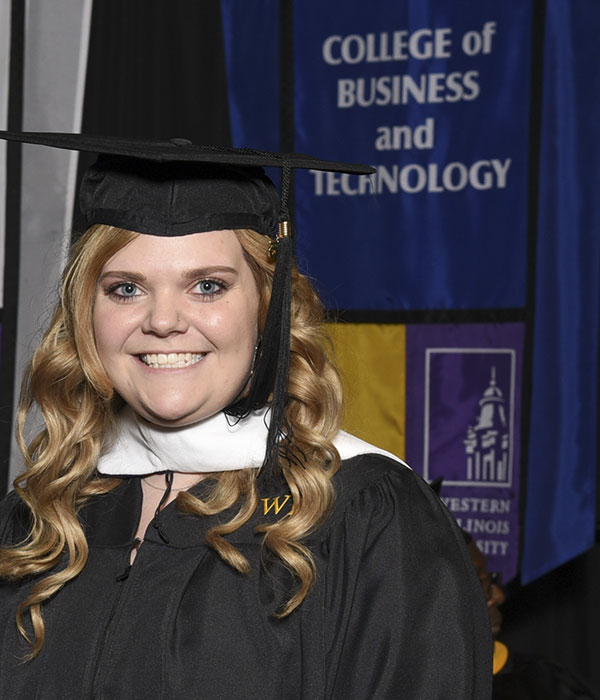Economics and Decision Sciences
Master of Science - Quantitative Economics
Data-driven, results proven!
The Master of Science in Quantitative Economics (MSQE) is an extremely flexible, STEM-designated degree with which graduates find employment in all sectors of the economy. A number of graduates have gone on to doctorate programs in Economics and other disciplines. The department is large enough to offer a wide selection of courses but small enough to provide individual attention. The department has alumni from over 70 countries, providing an excellent opportunity to gain exposure to other cultures.
The MSQE Integrated Masters Program allows students to use nine semester hours of B-level and 500-level Economics and Decision Sciences classes to concurrently satisfy either the BA in Economics and the MSQE or the BB in Economics and the MSQE degree. Students may choose from the following: ECON 581B, ECON 500B, ECON 504B, ECON 506B, ECON 507B, or up to three 400B elective courses in Economics or Decision Sciences (G suffix in the catalog). The exact bridge courses are determined by the student’s undergraduate and graduate advisor. More information may be found at the MSQE Integrated Program.
Why Quantitative Economics @ WIU?

Apply for the MSQE at WIU!
- STEM-designated program means opportunities to learn technical and quantitative skills highly sought after in the job market
- Large enough to offer a wide variety of courses yet small enough to provide individual attention
- All graduate courses taught by faculty holding a Ph.D. in Economics who are genuinely interested in students’ intellectual development
- Advising tailored to students’ personal needs and educational goals
- Opportunities for interacting with students from other cultures and countries
- Opportunities for students to present their research at department seminars and success in preparing students for admission to good to top-quality Ph.D. programs
- Interdisciplinary opportunities
Departmental Assistantship Opportunities
We offer a limited number of graduate assistantships, which are awarded on a competitive basis. The awards range from two-thirds time (requiring 13 hours of work per week) to full-time (requiring 20 hours of work per week). Both awards carry full tuition waivers for multiple semesters and a summer term, as well as a stipend for two semesters, contingent on maintaining a 3.0 GPA and satisfactory academic progress. Students work for the School of AFED as well as assisting faculty with courses. Limited research assistantships may also be available.
Assistantship recipients must satisfy all of the admissions prerequisites without any deficiencies. To be eligible for an assistantship, entering graduate students must have a cumulative undergraduate GPA of at least 3.0 and remain in good academic standing. A GRE score is required for those not coming from AACSB-accredited institutions.
Apply for Departmental Assistantship Apply for WIU Assistantship through the Graduate School
*Including summer coursework
Frequently Asked Questions:
- How long does it take to complete the MSQE? If a student enters the program with no deficiency courses to complete and works closely with the graduate advisor, two calendar years is standard. The 33-hour curriculum can be completed in under two years (including summer courses). Qualified WIU undergrads can complete it in less time via the MSQE Integrated Program.
- Can you waive the application fee? Under most circumstances, the department cannot waive application fees for new students. Current WIU students may have the fee waived.
- I'm an international student. What do I need to know about joining WIU? A large proportion of MSQE students are international. A major strength of the program is the diversity of the student body. The person in the next seat might be a Fulbright Scholar, the recipient of a Mandela scholarship, a German exchange student, or a Peace Corps Fellow, all studying and interacting in a friendly environment that is conducive to learning. The Center for Global Studies provides student services to WIU's international students and can ask routine questions. WIU offers International Student Scholarship opportunities.
- Where do your students go after graduation? We boast an extremely high placement rate, amongst the highest at WIU. Recent students landed jobs at large regional and international firms, such as John Deere, KPMG, Caterpillar, and Bank of America. A number of students choose to continue their studies at the doctoral level; we have a strong record of placing MSQE students in funded Ph.D. programs.
- Are there funding opportunities? The department offers a limited number of graduate assistantships, which are awarded on a competitive basis. A student receiving a graduate assistantship for the academic year also receives a tuition waiver for all classes taken during the academic year and one summer session. Fees cannot be waived. Limited research assistantships may also be available. MSQE students have found employment in other areas on a regular basis. This employment is almost always in the form of a graduate assistantship which also includes a tuition waiver. WIU has many other opportunities through the Graduate School.
- Do I need to take the GRE to be admitted? No, the GRE is not required for admission to the program. However, it is required for departmental funding decisions.
- How large are the classes? Will I get lost? The average class size at the 500 Level is 15 students. Graduate classes are usually capped at 25 students.
- Tell me about your faculty and curriculum. What areas of study do they specialize in? The MSQE curriculum is up-to-date and taught by a dedicated, research-active, and caring Ph.D. faculty. Faculty have unique specializations. We have a strong behavioral and experimental economics group, as well as monetary policy, development, and resource economics specialists. Faculty regularly guide student theses and have a record of publishing with students.
- Can I do an internship as an MSQE student? Yes, we offer an internship course, ECON599, typically taken over the summer. Students apply for internships as they would regular jobs, and the department allows course credit.
Apply for the MSQE at WIU!
Career Opportunities
Thanks to their strong analytical skills, our graduates find employment in a wide variety of careers.
Industry Placements
- JP Morgan Chase
- American Medical Association
- Bank of America
- KPMG
- Boeing
- Caterpillar
- Chicago Board of Trade
- Exxon
- Hewlett-Packard, Honeywell
- Illinois Power
- John Deere
- Merrill Lynch
- Northrop Grumman
- Principal Financial Group
- U.S. Comptroller of the Currency
- U.S. Treasury
Ph.D. Placements
- Univ. of Illinois - Chicago
- Univ. of Houston
- Univ. of Alabama
- Northern Illinois University
- Rochester
- Washington State
- Central Florida Univ.
- Univ. of Arkansas
- University of Memphis
- Northeastern Univ.
- Univ. of Tennessee
- CUNY - Binghamton
Alumni Job Titles
- Account Executive
- Branch Manager and Registered Representative
- Credit Risk Analytics Consultant
- Data Analyst/data scientist
- Economic Consultant
- Executive Policy Analyst-Economics
- Financial Analyst
- Management Analyst
- Information Services Manager
- Operations Systems and Procedures Manager
- Principal Consultant - EDP
- Manager Financial Futures Department
- Security Broker/Dealer
- Statistical Analyst
- Senior Export/Import Specialist
- President, Manufacturing Company
- Vice President - Securities, Inc.

Please refer to the graduate catalog for detailed program information and course requirements.
Regularly Offered Economics (ECON) core classes |
Regularly Offered Economics (ECON) Electives |
|
ECON 509 - Fundamentals of Economic Theory |
ECON 420G Economic Development |
|
DS490G - Statistical Programming |
ECON 430G Environmental Economics |
|
ECON 500 - Adv. Macroeconomics |
ECON 440G Labor Theory |
|
ECON 504 - Price Theory |
ECON 445G Game Theory and Economic Behavior |
|
ECON 581 - Adv. Quantitative Economics |
ECON 465G Economics of Energy |
|
ECON 487G - Econometrics I |
ECON 471G International Monetary Economics |
|
ECON 507 - Econometrics II |
ECON 488G Experimental Economics |
|
ECON 602 Department Research Seminar |
ECON 489G Behavioral Economics |
|
ECON 603 Comprehensive Examination |
ECON 501 Readings in Economics |
|
ECON 496G Special Topics in Economics |
|
|
ECON 490G Health Economics |
|
|
ECON 599 Internship (Permission Required) |
|
|
ECON 600 Thesis Research and ECON 601 Thesis |
Decision Sciences (DS) courses commonly recommended (note: if you are enrolled in the PBC-BA, you cannot double count those courses as ECON electives in the MSQE):
- DS 435G Applied Data Mining for Business Decision-Making
- DS 485G Big Data for Business Decisions
- DS 489G Seminar in Contextual Business Analytics
- DS 500 Introduction to Business Analytics
- DS 510 Foundations of Business Analytics
- DS 421G Data Visualization
- DS 423G Management Science Techniques and Business Analytics
- DS 435G Applied Data Mining for Business
- DS 560 Categorical Data Analysis Using Logistic Variables
- DS 480G Business Analytics and Forecasting
Mathematics/Statistics Courses (MATH/STAT) and other Popular Electives (such as ACCT and FIN):
At the decretion of the Graduate Advisor
Graduate students and ECON599:
To have a Summer internship reviewed, please navigate to https://form.jotform.com/jllin/afed-internship-application to apply to have your internship approved. You will then be contacted by the AFED office, and they add it to your schedule if approved. Any academic integrity violations will automatically disqualify you from approval.
Admission Requirements Apply for the MQSE at WIU!
Applicants must first meet the general admission requirements of the School of Graduate Studies. An undergraduate degree in Economics is NOT required for admission to the MSQE, but some courses in economics are recommended. Majors in Mathematics and Statistics have done particularly well; students with a variety of undergraduate majors have also been successful and have become some of our most notable and supportive alumni. The GRE is not required for regular admission, but the following prerequisites are:
Principles of Economics
- Principles of Macroeconomics (ECON 231) and Principles of Microeconomics (ECON 232)
Intermediate Economic Theory
- Intermediate Macroeconomics (ECON 331) and either Intermediate Microeconomic Theory (ECON 330 or ECON 332)
Calculus and Statistics
Students will require:
- MATH 137 or an equivalent course in calculus. Linear algebra and a second course in calculus are highly recommended.
- STAT 171 or an equivalent course in statistics.
If you have not completed the prerequisites, you may be eligible for conditional admission. Any remaining prerequisites can be taken during your first semester. Some courses, such as ECON 408, STAT 171, DS303, or ECON 381, may be required as deficiency courses on admission.
Degree Requirements
The Master of Science (MS) in Quantitative Economics degree program is a 33-semester hour (sh) program consisting of 21 sh of core courses. These courses are Fundamentals of Economic Theory (ECON509), Mathematical Techniques (ECON 581), Macroeconomic Theory and Policy (ECON 500), Price Theory (ECON 504), Econometrics I (ECON 487G), Econometrics II (Econ 507), and DS 490G (Statistical Software for Data Management and Decision Making).
For their electives, students can select from a variety of courses in ECON and other disciplines to complete their degree plans. There are three exit options: (1) thesis, (2) internship, (3) non-thesis.
- The thesis option requires ECON 600 (Thesis Research), ECON 601 (Thesis), and 6 s.h. of electives.
- The internship option requires ECON 599 (approved Internship, typically over the summer) and 9 s.h. of elective coursework (at least 3 s.h. of electives must be from Economics with the ECON prefix).
- The "all coursework" option requires 12 s.h. of approved electives in which at least 6 s.h. are from Economics (ECON).
All students, regardless of exit option, are also required to complete two semesters of Department seminar (ECON 602, 0 s.h.) and complete the exit examination in their final semester (ECON 603, 0 s.h.).
MSQE Integrated Masters Program
Students in the integrated program are allowed to use nine semester hours of B-level and 500-level Economics and Decision Sciences classes to satisfy either the Bachelor of Arts in Economics and the Master of Science in Quantitative Economics or the Bachelor of Business in Economics and the Master of Science in Quantitative Economics degree. Students may choose from the following: ECON 581B, ECON 500B, ECON 504B, ECON 506B, ECON 507B, or up to three 400B elective courses in Economics or Decision Sciences. The exact bridge courses are determined by the student’s undergraduate and graduate advisor. More information may be found at MSQE Integrated Program.
Apply for the MSQE at WIU!
Contact Information: Economics and Decision Sciences
School Director: Dr. Jessica Lin
Email: JL-Lin@wiu.edu
QEcon Email: economics@wiu.edu, afed@wiu.edu
Location: Stipes Hall 431
1 University Circle
Macomb, IL 61455-1390
Phone: (309) 298-1152
Quantitative Economics Graduate Coordinator: Dr. Alice Melkumian
Email: aa-melkumian@wiu.edu
Location: Stipes Hall 430E
1 University Circle
Macomb, IL 61455-1390
Phone: (309) 298-1152
Contact Information: College of Business & Technology (CBT)
Interim College Dean: Dr. Craig Conrad
Personal Email: CA-Conrad1@wiu.edu
College Email: cbt@wiu.edu
Location: Stipes Hall 101
1 University Circle
Macomb, IL 61455-1390
Phone: (309) 298-2442
Fax: (309) 298-1039

A Message from the Program Coordinator and Graduate Advisor
Dear Graduate Applicant,
Thank you for your interest in the Economics and Decision Sciences Graduate Programs at Western Illinois University. Our programs are well-suited to students who are looking to enhance their career potential in economics and related fields as well as to students who are thinking about going on for a Ph.D. in economics. Our unique system allows you to select a course of study that fits your goals while the core courses ensure that you are trained in the fundamentals of graduate-level economics.
Our graduate faculty are committed to excellence in training economists. Graduate class sizes are typically small—many in the range of 8 to 15 students—providing an excellent environment for learning. Our graduate curriculum gives careful attention to both theory and practice. This balance is the key to modern economics.
Our facilities are another feature of the program. Nearly all the graduate courses in economics are in the same building, Stipes Hall. Computers in the building have a variety of software packages, including SAS, SPSS, Stata, and Mathematica. A “cyber-café” on the first floor, aptly named “Dividends,” is a great place for individual conversations over a cup of coffee. The Leslie F. Malpass Library is next door, providing a convenient place for group and individual study.
Students without a strong undergraduate background in economics are often required to complete intermediate-level undergraduate courses before enrolling in the graduate core. At least a year of calculus is expected, though all students, regardless of their level of math preparation, are placed in our mathematical techniques course during their first semester.
Financial assistance in the form of graduate assistantships is available on a competitive basis to qualified students. Assistantship duties include staffing the School office, helping in the classroom, and assisting faculty with research projects — all of which are good practices for those interested in an academic career. Finally, we have an established record of placing our graduates in internships, jobs, and ranked Ph.D. programs.
If you have any questions about the program, please send me an e-mail. We look forward to hearing from you.
Assistantship Opportunities
We offer a limited number of graduate assistantships, which are awarded on a highly competitive basis. The awards range from two-thirds time (requiring 13 hours of work per week) to full-time (requiring 20 hours of work per week). Both awards carry full tuition waivers for multiple semesters and a summer term, as well as a stipend for two semesters, contingent on maintaining a 3.0 GPA and satisfactory academic progress. Students work for the School of AFED as well as assisting faculty with courses and research.
Assistantship recipients must satisfy all of the admissions prerequisites without any deficiencies. To be eligible for an assistantship, entering graduate students must have a cumulative undergraduate GPA of at least 3.0 and remain in good academic standing. Apply for Departmental Assistantship Apply for WIU Assistantship through the Graduate School

Connect with CBT: